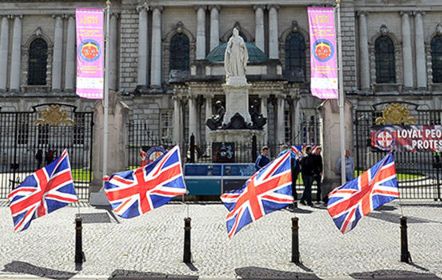Supreme Court rules PSNI `had power to stop flag protests`
An under-strength force accused by the UK`s highest court of misconstruing its legal powers has been defended in the face of officer numbers being “dangerously eroded”.
An under-strength force accused by the UK`s highest court of misconstruing its legal powers has been defended in the face of officer numbers being “dangerously eroded”. The Police Service of Northern Ireland (PSNI) has been left with an “impossible” task of dealing with widespread trouble because it is hundreds of officers short of its peacetime minimum, it is claimed. And an `insufficient` force leaves “upholding the law” open to interpretation, warned Police Federation for Northern Ireland (PFNI) chairman Mark Lindsay. His remarks come as a Belfast resident won a legal case at Britain`s top court over the failure of the PSNI to prevent union flag protests. Five Supreme Court justices in London ruled unanimously in favour of the unnamed resident, announcing that the force did have the legal power to stop the parades. Mass loyalist demonstrations, some of which descended into violence, were staged across Northern Ireland in opposition to Belfast City Council`s decision to limit the number of days the union flag flew over City Hall. In April 2014, a judge at the High Court in Belfast ruled in favour of the resident of the nationalist Short Strand area of east Belfast, who claimed the PSNI`s failure to stop un-notified loyalist marches past his home between December 2012 and February 2013 breached his right to privacy and family life. However, later that year, appeal judges overturned the ruling following a challenge by the PSNI. The resident then took his case to the Supreme Court. On Wednesday (February 1), the justices said the PSNI had “misconstrued” its legal powers to stop parades passing through or adjacent to the Short Strand area. As permission for the loyalist marches was not sought from the Parades Commission adjudication body, the events were not lawful. Mr Lindsay pointed out that a “consideration” as to why illegal Union flag protests were allowed to take place was down to the PSNI not having sufficient officer numbers. He said: Given the fact that the PSNI was hundreds of officers short of the peacetime minimum, it would have been impossible to deal with widespread trouble if orders were given to prevent illegal parades.” More than 100 PSNI officers were injured and more than 500 people have since been charged or reported in connection with the protests. Mr Lindsay added: A below-strength service would not have had sufficient resilience to robustly deal with un-notified parades.” Turning to the present, he added: Today is no different. In fact, we have fewer officers on the payroll now than we did in 2012. “The interpretation of the law is one thing, but having sufficient numbers present to uphold the law is quite another matter. We must not delude ourselves that being 700 short of a peacetime figure is sufficient. Our numbers are dangerously eroded and the sooner that fact is acknowledged by the chief constable and our political paymasters, the better. In ruling in favour of the resident, referred to only as DB, the judge at the High Court in Belfast found that the PSNI had not properly understood its powers to intervene in the protests. But three appeal judges, among them Northern Ireland`s Lord Chief Justice Sir Declan Morgan, came to a different conclusion and allowed the PSNI`s appeal against the judgment. The PSNI had argued that the original ruling regarding its handling of union flag protests would have placed major constraints on how it polices future parades and demonstrations in the region. They said commanders` decisions to contain the protests and pursue arrests and charges at a later date fell within their discretionary powers. But Lord Kerr, giving the ruling of the Supreme Court, concluded: “I would reverse the decision of the Court of Appeal and make a declaration that, in their handling of the flags protest in Belfast during the months of December and January, PSNI misconstrued their legal powers to stop parades passing through or adjacent to the Short Strand area.” Lord Kerr said the flags protest presented


